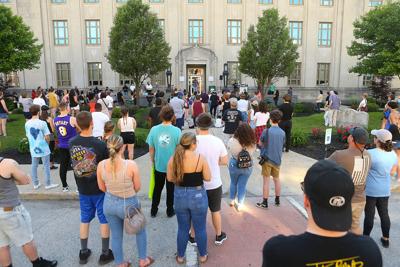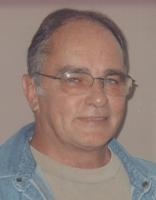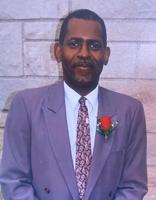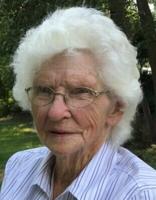INDIANAPOLIS — Black leaders in the Indiana General Assembly have issued new policy recommendations to the state and to local governments in the wake of questions about how to hold law enforcement accountable for wrongful deaths.
“We will not let another unjustified black death go unnoticed without change,” said Rep. Robin Shackleford, D-Indianapolis, at the opening of a brief press conference held on the steps of the Statehouse Friday by the Indiana Black Legislative Caucus, or IBLC.
Shackleford, who chairs the IBLC, was joined by black leaders from the Indiana Senate and House of Representatives. Rep. Gregory Porter, D-Indianapolis, held up a black shirt that bore the words “I can’t breathe,” some of the last words spoken by George Floyd, a Minnesota man killed in police custody last week. The words have become a rallying cry for reform and racial justice.
Because months remain until the 2021 legislative session, which begins in January, IBLC leaders said the governor should take executive action to protect black lives. The leaders called on Holcomb to immediately ban chokeholds as an accepted restraint used in arrests, for example, and to establish a Statewide Criminal Justice Commission that would advise the state on criminal justice reform.
During Friday’s virtual press briefing, Holcomb did not specifically address the new recommendations shared by the IBLC when asked for his thoughts. He instead said his administration wants to listen to as many voices as possible when making decisions about how to respond to police brutality and protect black lives. He referred to future meetings scheduled with the caucus to review the new agenda.
“We need to listen and, most importantly, I think, we need to act,” Holcomb said. “We’re taking a lot of time to make sure that we hear from everyone that shares these concerns, and we’re not exclusionary. We’re going to be very thoughtful about the actions we do take.”
It remains unclear if he will issue an executive order to ban chokeholds as a means of arrest.
Without action from the governor, the IBLC said it is up to local officials, like mayors and city councilors, to ban chokeholds as a police restraint. The IBLC also asked cities to ensure their police departments have access to and use body cameras.
Indianapolis Mayor Joe Hogsett announced a series of reforms Friday that are largely in line with demands made by the IBLC and advocacy groups.
Hogsett said Indianapolis Metropolitan Police Department is preparing to update its use of force policy to include an explicit ban on chokeholds in arrests. The policy also includes new, explicit guidelines that officers should intervene and report inappropriate uses of force, among other updates.
“This is a beginning, not the end,” Hogsett said. “These policies are important, and once implemented, we will have a better city than ever before. But radical social change can never be diminished into an exercise of simply checking a new box, or a few boxes, and claiming victory.”
Holcomb addressed these points from a statewide perspective in a virtual press briefing Monday, after a weekend of peaceful protests that turned violent. He condemned the police killing of George Floyd and said he is — and already has — committed to a list of policies to combat police brutality and systemic racism.
“Our collective conscience has been awaken to the point where we need to all have a list,” Holcomb said. “And I will have – I do actually have [a list], but I want to add to it, obviously.”
Soon after, leaders within the IBLC said Holcomb was not working with them to secure priority policies, and confirmed Friday they had yet to meet with Holcomb directly. And when pressed about why the Indiana General Assembly only passes a handful of the caucus’ priority legislation each year, Holcomb focused instead on the achievements — the passage of a statewide hate crimes law, for example.
In response to continued police brutality against black men and women, caucus leaders have called on the state to mandate law enforcement wear body cameras and to review use of deadly force policies, among other demands. Leaders have also asked for comprehensive training for police and the appointment of special prosecutors to lead police conduct reviews and use of force investigations.
During the 2021 legislative session, IBLC leaders will also introduce bills on a range of reform topics, including anti-racial profiling laws, mental health reviews for police officers and a public database where citizens can report complaints about law enforcement. The IBLC will host town halls this summer to gather public input on these topics and more.
The Black Lives Matter movement and other advocacy groups have protested around the country in the days since Floyd’s killing at the hands of police. This weekend, demonstrations are expected to continue in Indianapolis, when Mayor Joe Hogsett said he will again employ a curfew to limit how many protestors are out after dark and to prevent damage to businesses.
In anticipation of the crowds expected in downtown Indianapolis, state health officials said they will offer free COVID-19 screenings to protestors and others in the area.
Indiana State Health Commissioner Dr. Kristina Box outlined the testing service Friday during a statewide press conference, saying testing will be available at no cost at a parking lot near the intersection of Ohio Street and Capitol Avenue from 10 a.m. to 5 p.m. Saturday.
“We’ve seen thousands of people coming downtown this week — some wearing masks, some not,” Box said. “And this is the timeframe when we would expect to see an increasing level of infection.”
Box said screenings might also be offered Sunday if there is enough demand.


















Commented
Sorry, there are no recent results for popular commented articles.